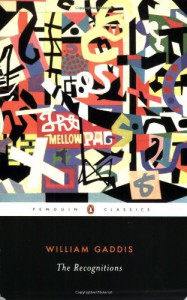 I was a little intimidated writing a review of this book, given some of the excellent reviews that have already been posted. But someone pointed out that neglected books like this need champions, so I will add another voice of encouragement for people to read a book that, as has been pointed out many times, is much praised and little read. Since Bonnie’s review below has said a lot of the things that I would have liked to say, and said them quite well, I won’t repeat them. I encourage everyone to read her review, as well as Ian’s.
I was a little intimidated writing a review of this book, given some of the excellent reviews that have already been posted. But someone pointed out that neglected books like this need champions, so I will add another voice of encouragement for people to read a book that, as has been pointed out many times, is much praised and little read. Since Bonnie’s review below has said a lot of the things that I would have liked to say, and said them quite well, I won’t repeat them. I encourage everyone to read her review, as well as Ian’s.The Recognitions is a difficult and dense book. If you don’t like difficult books, this one isn’t for you. I’ve noticed something about many of the reviews of this book, which is that almost all of them praise the plot: many of the positive reviews think it was worth digging through the layers of difficulty to get to that plot, while many of the negative ones think it wasn’t. I wrestled with this until I realized it was the wrong question. Those layers are not an obstacle to be overcome in search of a plot, but are themselves the reason this book is so great.
The Recognitions is difficult for two broad reasons; the writing itself, and the many esoteric references it contains. I’ll start with the writing.
Much has been made of Gaddis’ dialogue and the lack of quotation marks or identification by name of the speakers. Frequently, people are identified only by certain mannerisms of speech, or by an article of clothing that was mentioned in passing 300 pages past. If you’re not paying close attention to the text, you’ll miss it. This wasn’t done to frustrate the reader or to make things difficult for the sake of difficulty; it was done because when it works, it really works. The many party scenes, for example, replicate the jumble and confusion of multiple voices perfectly, striped of the narrative interruption of “Susan said” and “Sam replied”.
Another thing his writing style captures is the interconnectedness of events and people. Everything in The Recognitions circles around and encompasses different characters, usually without their knowing it. Readers only know it because they are privy to the journey of these objects and ideas, although they are frequently mentioned in such an understated way that the reader is left to make these recognitions on their own, without an autherly spotlight to guide the way. This makes the recognition of these things that much more startling and satisfying.
I feel a little more ambiguous about the many esoteric references to religion, art, history, languages etc. I read this book once about 25 years ago and made no effort to look up any of these references (I wouldn’t have known where to start with most of them anyway). I just reread it, making efforts to explore these references fairly completely, a task made much easier by the internet and this site in particular link: Reader’s Guide). The first read was much faster and easier, but I didn’t get nearly as much out of the novel as I could have. The second read was often a slog, and I read far more about some things than was needed to appreciate their resonance within the novel. There’s a happy median there somewhere, and it’s up to the individual to find it.
The theme of The Recognitions is forgeries and frauds - in art, religion, business and relationships. Gaddis’ style is perfectly suited to make the reader complicit in recognizing (or not recognizing) these forgeries. This is also an incredibly funny book. You’ll know if you like Gaddis’ humor by the end of page 2, so get a library copy and give it a shot. Some of you will find a new favorite book, while others will set it down and never pick it up again. Either one is okay. It’s not a book for everyone, but if it is for you you’ll be glad you found it.






